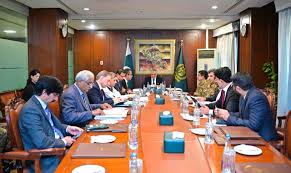Deputy Prime Minister and Foreign Minister of Pakistan, Senator Ishaq Dar, has issued a clarion call for urgent and well-structured reforms aimed at restoring the financial sustainability of the country’s energy sector. In a high-level meeting convened to address the growing concerns in the energy landscape, Dar emphasized that Pakistan’s energy sector is at a critical juncture, and bold decisions must now be taken to stabilize the system both financially and operationally.
The meeting brought together key figures from the energy ministry, finance officials, members of the Special Investment Facilitation Council (SIFC), and senior advisors to formulate a unified strategy for tackling the persistent challenges undermining energy sector viability.
Dar’s message was clear and resolute, Pakistan can no longer afford the compounding inefficiencies, unchecked losses, and flawed subsidy mechanisms that have plagued its power infrastructure for decades. He emphasized that it is not only about fixing numbers on paper, but also about ensuring affordable, reliable, and uninterrupted electricity for the people of Pakistan, especially the most vulnerable.
One of the central themes discussed was the high level of transmission and distribution (T&D) losses a long-standing issue in Pakistan’s power grid. These losses, often caused by outdated infrastructure, technical faults, power theft, and poor maintenance practices, have been eating into national revenues and pushing electricity prices higher for end consumers. Dar stressed that significant investments in grid modernization and strict enforcement measures are non-negotiable steps if Pakistan wants to reverse this downward spiral.
In addition, the rationalization of subsidies was identified as a top priority. While subsidies play a crucial role in protecting low-income groups, poorly targeted or overly generalized subsidies create massive fiscal burdens and often benefit wealthier segments disproportionately. Dar recommended a targeted subsidy model, supported by data analytics, that channels financial support to households that truly need it, without compromising budgetary discipline.
A critical element in the reforms proposed by the Deputy Prime Minister was the revision of the existing tariff structure. The current pricing models, he explained, are outdated and disconnected from actual production and distribution costs. He advocated for a more transparent and cost-reflective pricing mechanism that does not pass undue burden onto the consumer but instead encourages responsible usage and financial sustainability for power producers and distributors alike.
Dar also called on all departments and stakeholders to develop and submit actionable, time-bound policy recommendations that would drive efficiency, curb waste, and create resilience within the energy sector. These recommendations must be aligned with national energy priorities, including the gradual transition to renewable energy sources, improved regulatory oversight, and streamlined public-private partnerships to bring in investment and innovation.
Beyond numbers and metrics, Dar tied the success of energy sector reforms to the broader goals of national economic revival. He pointed out that without a financially stable and technically efficient energy system, the country’s industrial output, export competitiveness, and investor confidence would remain compromised. Hence, energy reform is not just a sectoral issue, it is a national economic priority.
As part of the government’s long-term commitment, the Deputy Prime Minister reiterated Pakistan’s dedication to increasing the share of renewable energy to 60% by 2030. He underscored that this transformation would not only help in reducing carbon emissions and dependence on imported fuels but would also reduce long-term costs and make electricity more affordable and accessible.
In concluding the meeting, Dar emphasized that bold decisions and collaborative action are essential to steer Pakistan’s energy sector out of crisis. He urged federal and provincial departments, regulatory authorities, and industry stakeholders to step out of bureaucratic inertia and push forward a cohesive reform agenda that addresses immediate pain points while laying the foundation for sustainable growth.
Pakistan’s energy sector stands at a crossroads and the decisions taken today will determine whether future generations experience power security or remain stuck in cycles of shortage, inefficiency, and economic vulnerability. The roadmap set by the Deputy Prime Minister offers a realistic and comprehensive path forward, but it will require unified political will, institutional integrity, and a sharp focus on execution.



Comments (0)
No comments yet. Be the first to comment!
Leave a Comment